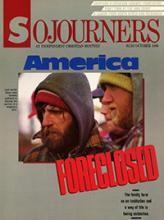Albertina Sisulu is, after Winnie Mandela, the best known woman in South Africa. She is the co-president of the United Democratic Front, the largest opposition coalition in South Africa, and the matriarch of a family known for decades of resistance to apartheid.
Sisulu's husband, Walter, is serving a life prison term with Nelson Mandela and other leaders of the outlawed African National Congress (ANC). She has not seen her husband outside of prison for 25 years. Two of her children are in exile, and an adopted son is in prison on treason charges. Another son, Zwelakhe Sisulu, is a young newspaper editor widely recognized as an emerging theoretician of black resistance who was detained in June under South Africa's state of emergency decree.
Sisulu herself has been in and out of jail and has suffered many restrictions, including being placed under house arrest for 10 years. Both at her home, and at the medical clinic where she works, Sisulu keeps bags packed with changes of clothing and toiletries, ready for when she is detained.
In a newspaper interview, she was asked if she ever despairs when her children, like her husband before them, are taken off to prison. "That is what we live for, to struggle for freedom. It does not worry me at all. In fact, I'm happy that my children understand why we are struggling." But are there ever doubts, she was asked. "No," she said emphatically, "I'm very hopeful."
Isaac was 14 years old when I met him three years ago in the little town of Jalapa in Nicaragua's northern frontier. Though only a young teenager, Isaac was very articulate about his country's struggle.
One member of our Witness for Peace team asked him, "Isaac, what do you most want for the future?"
He replied, "I want my children not to be marginal."
Read the Full Article

